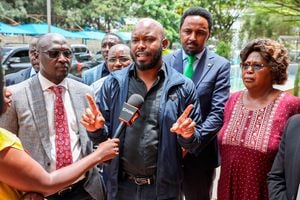Health ministry ‘broke law’ in medical kits deal

Former Health Cabinet Secretary Cleopa Mailu.
What you need to know:
- In a report released by the Senate on Tuesday, the auditor told the committee it is not clear how MES was converted and implemented to public procurement after being approved as PPP.
- The Auditor-General also told the committee chaired by Isiolo Woman Representative Fatuma Dulo that it did not find a written shift in policy to justify the change of financing arrangement from PPP.
- The ministry defended itself, saying MES is a variation of PPP with the private sector bringing together the equipment and being paid by the government.
The Ministry of Health under Dr Cleopa Mailu violated the law in changing the concept of the Sh63 billion Managed Equipment Services (MES) scheme from public-private partnership (PPP) to a public procurement, the Auditor-General has said.
In a report released by the Senate on Tuesday, the auditor told the committee it is not clear how MES was converted and implemented to public procurement after being approved as PPP.
“Public procurement and disposal are governed by the Public Procurement and Disposal Act, 2005 (repealed and re-enacted as Public Procurement and Asset Disposal Act, 2015,) and regulated by the Public Procurement Regulatory Authority,” reads the report by the team.
The Auditor-General also told the committee chaired by Isiolo Woman Representative Fatuma Dulo that it did not find a written shift in policy to justify the change of financing arrangement from PPP.
The senators were told that the report on the needs assessment resulted in the development of a Concept Paper by the ministry in 2014.
The paper envisaged the project as a PPP based on a “Build, Lease and Transfer” model and was in tandem with the 2014 Kenya Health Policy.
“A subsequent report by the PPP Unit in October 2014 indicated that the project had been approved for implementation as a PPP. However, the MoH later proceeded to adopt an MES model,” the report says.
The Auditor-General concluded that value for money could not be guaranteed, given the inefficiencies of the procurement and the absence of minutes of the Inspection and Acceptance Committee.
Ministry’s defence
The ministry defended itself, saying MES is a variation of PPP with the private sector bringing together the equipment and being paid by the government.
The system was adopted after the ministry realised it was going to take long to go the PPP way, officials said.
“This is because of the time the PPP takes and there was an urgent need to equip hospitals in the shortest time possible,” the June 2014 letter from the ministry says.
The Health Principal Secretary was Mr Julius Korir.
The ministry said it conducted a study and found MES to be the most suitable approach to equip hospitals.
According to the Ministry of Health, manufacturers would supply the equipment, install them, train personnel and maintain the gadgets as per the standards in exchange for a fixed quarterly payment for seven years.
On July 11, 2014, the ministry issued an international competitive tender for the MES arrangement.
The document states that 30 companies applied for different lots, out of which five were awarded the tenders.
The $45,991,449 theatre equipment tender was won by Shenzhen Mindray Bio-Medical Electronics Ltd.
The renal equipment tender valued at $23,691,059 was awarded to Bellco S. of Italy.
Intensive care unit equipment ($36,492,176) was given Phillips Medical Systems Nederland with radiology equipment ($238,279,499) being awarded to General Electric East Africa Services Ltd.
The $88,027,973 theatre CSSD equipment was given to Esteem Industries.
The contract
The entire seven-year MES original contract was valued at $432,482,156.8 as per the Ministry of Health document.
It means every county government would be paying Sh118 million per month.
Because four other referral hospitals gained from the programme, they too had to pay for the gadgets, reducing the amount paid by a county to Sh97 million.
However, the figure shot to Sh200 million in 2017, with the government saying some devolved units requested additional equipment.
The contact of every company was revised and the cost of the programme shot from $432,482,156.80 to $469,490,240.91, the Auditor-General said.





